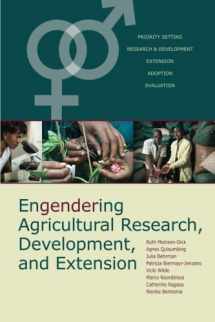
Engendering Agricultural Research, Development, and Extension
ISBN-13:
9780896291904
ISBN-10:
0896291901
Author:
Ruth Meinzen-Dick, Agnes Quisumbing, Julia Behrman, Patricia Biermayr-Jenzano, Vicki Wilde, Marco Noordeloos, Catherine Ragasa, Nienke Beintema
Publication date:
2012
Publisher:
International Food Policy Research Institute (IFPRI)
Format:
Paperback
152 pages
FREE US shipping
Book details
ISBN-13:
9780896291904
ISBN-10:
0896291901
Author:
Ruth Meinzen-Dick, Agnes Quisumbing, Julia Behrman, Patricia Biermayr-Jenzano, Vicki Wilde, Marco Noordeloos, Catherine Ragasa, Nienke Beintema
Publication date:
2012
Publisher:
International Food Policy Research Institute (IFPRI)
Format:
Paperback
152 pages
Summary
Engendering Agricultural Research, Development, and Extension (ISBN-13: 9780896291904 and ISBN-10: 0896291901), written by authors
Ruth Meinzen-Dick, Agnes Quisumbing, Julia Behrman, Patricia Biermayr-Jenzano, Vicki Wilde, Marco Noordeloos, Catherine Ragasa, Nienke Beintema, was published by International Food Policy Research Institute (IFPRI) in 2012.
With an overall rating of 3.5 stars, it's a notable title among other
books. You can easily purchase or rent Engendering Agricultural Research, Development, and Extension (Paperback) from BooksRun,
along with many other new and used
books
and textbooks.
And, if you're looking to sell your copy, our current buyback offer is $0.46.
Description
Research has shown that women, when given the capital and opportunity, make unique, positive contributions to everything from agricultural productivity to poverty reduction. It comes as little surprise, then, that agricultural research, development, and extension systems are generally more successful when scientists, researchers, and extension agents pay attention to gender issues. However, women continue to be underrepresented and underserved, and their contributions remain mostly untapped in national and international agricultural research. Worldwide, gender roles are culturally defined in all aspects of farming, including ownership, management, and natural resources, and these definitions constrain and marginalize women. Even within the agricultural research community, most scientists and extension agents are male. Engendering Agricultural Research, Development, and Extension argues that the paradigm for agricultural and food security development needs to move beyond a focus on production and toward a broader view of agricultural and food systems, one that recognizes women’s distinct role in ensuring the food security of their households. Incorporating gender issues and a commitment to gender sensitivity into agricultural research is necessary in developing extension systems that meet the needs and preferences of men and women, satisfy the food needs of future populations, and improve the welfare of the poor.


We would LOVE it if you could help us and other readers by reviewing the book
Book review

Congratulations! We have received your book review.
{user}
{createdAt}
by {truncated_author}


